Module Declaration
Synopsis
Declare a module.
Syntax
module Package::Name ❶
Import₁ ❷
Extend₁
...
Importₙ
Extendₙ
SyntaxDefinition₁ ❸
...
SyntaxDefinition₂
Declaration₁ ❹
...
Declarationₙ
Description
A module declaration consists of:
- ❶ A module name consisting of
::-separated package names followed by::Name - ❷ Zero or more Imports or Extends
- ❸ Zero or more Syntax Definitions
- ❹ Zero or more declarations of Variables, Functions or Algebraic Data Types
The Import, Extend and Syntax Definition are positioned at the top of the module because they are used internally to generate parsers for the Concrete Syntax, Patterns and Expressions used in Variables, Functions and Algebraic Data Types.
The module name Name will be used when the current module is imported in another module. A module name is in general a qualified name of the form:
_Name₁_::_Name₂_:: ... ::_Nameₙ_
which corresponds to a path relative to the root of the current workspace.
The constituents of a module are shown in the figure below.

An Import declares other modules that are used by the current module. Following imports, a module may contain declarations (in arbitrary order, but a Syntax Definition can occur directly following the imports) for:
Each declaration may contain a private or public keyword that determines
the visibility of the declared entity.
The entities that are visible inside a module are
The private or public entities declared in the module itself.
The public entities declared in any imported module.
The only entities that are visible outside the module, are the public entities declared in the module itself. If different imported modules declare the same visible name, it can be disambiguated by explicitly qualifying it with its module name:
_Module_ :: _Name_
Each module resides in a separate file with extension .rsc.
Examples
Here is the Hello module:
module demo::basic::Hello
import IO;
void hello() {
println("Hello world!");
}
It defines a module with the name demo::basic::Hello and imports the IO library.
Finally, it declares the hello function.